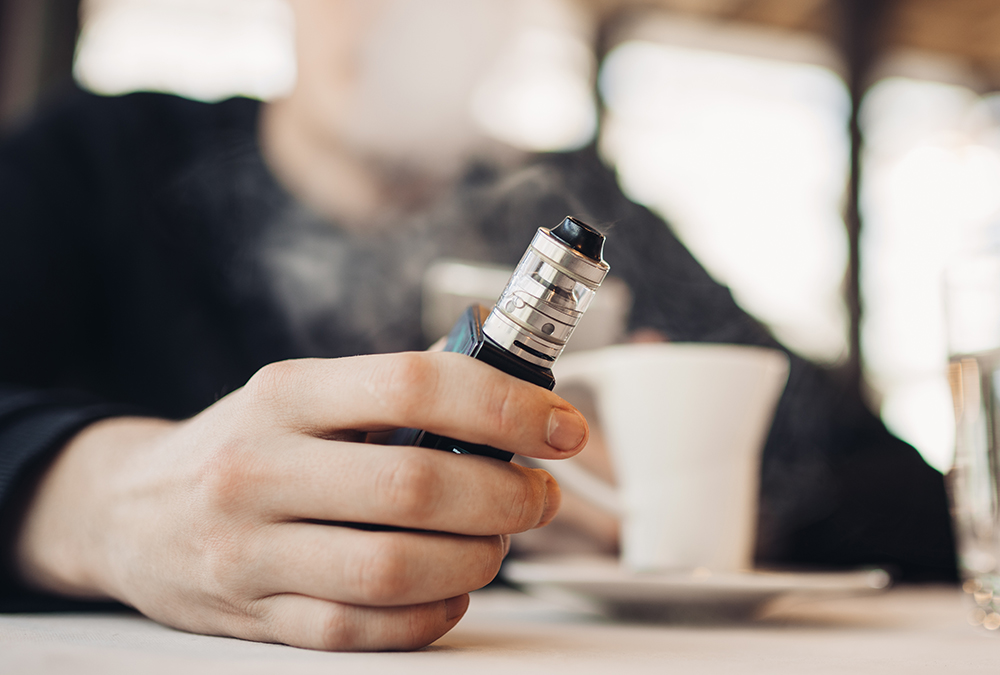Mon - Fri 9.00 - 17.00
Call us +1 (888) 825-9321

Whether you vape with flavored vitamins or caffeine products, or you use cannabinoids like medical marijuana or CBD, each one of those compounds needs a carrier oil so it can be used in your vaporizer. One of those oil options is MCT oil, which is also used as healthy cooking oil, a keto support supplement, and more. But what exactly is MCT oil and is vaping MCT oil healthy…or even safe? Read on to find out your oil options in vape cartridges, and which one is safe enough to meet your standards.
It’s common knowledge that inhaling smoke and the carcinogens in traditional tobacco cigarettes is bad for your health and the health of everyone around you. In an effort to become healthier, smokers are turning to vaporizers and e-cigarettes.
People use vaporizers to access the following appealing substances.
It should be noted that vaping products containing vitamin E are being linked to vape-related illnesses and lung injuries according to the CDC, so vitamin E should never be included in any vape products or CBD tinctures you purchase (1).
Vape oils come in many different varieties, and manufacturers have flooded the market in an attempt to capitalize on the vaping trend. Here are the various dissolving agents they may use.
Vape products sometimes also contain heavy metals from the vaporizer itself and dangerous thinning agents that are meant to help the body absorb the main ingredient better but can also produce carbonyl compounds (which is a fancy term for carcinogens) when they’re heated. This completely destroys any potentially positive aspects of vaping. That is why it’s so important to know what you’re inhaling when you’re vaping, which leads to the question at hand: is vaping MCT oil safe?

Short answer: yes…to an extent.
MCT oil is at least arguably the safest option available for use in your e-liquid cartridges. Whether you’re vaping CBD products, psychoactive substances produced by the cannabis industry, or you’re using vaporizing as a quick way to ingest your vitamins, scientific study has shown that far from the flavorings of vape products being the harmful gateway drug that leads children to the dispensary, it’s the carrier oils we should be concerned about.
A 2017 study on the carbonyl compounds produced by vaporizing cannabis oil thinning agents found that the high temperatures applied to certain thinning agents in vape cartridges produced harmful byproducts (2). Specifically, they tested four carrier substances: propylene glycol, vegetable glycerin, polyethylene glycol 400 (PEG 400), and MCT oil. Each of these compounds was heated to 230 °C, and their vapors were then tested for the known toxins formaldehyde, acetaldehyde, and acrolein.
The analysis showed that PEG 400 created significantly more acetaldehyde and formaldehyde than propylene glycol, vegetable glycerin, or MCT oil did, though the production of acrolein did not differ significantly across the substances. Their conclusions were clear: propylene glycol and PEG 400 produced high levels of acetaldehyde and formaldehyde when heated, but naturally derived vegetable glycerin and MCT oil did not.
In fact, one inhalation of PEG 400 could expose you to 1.12% of the daily exposure limit of formaldehyde, which is, of course, known to be a cancer-causing agent found in tobacco cigarettes and used to embalm corpses (3).
Aside from the vaping substances that are now proven to cause harm, please keep in mind that vaping is still a new technology, and that our lungs were only designed to gulp natural air, moisture, and oxygen, not inhale oils. A safer way to inhale active substances like CBD and THC may be to do so through a humidifier, because even MCT oil can cause lipid pneumonia, a temporary condition that is nevertheless the result of vape overuse that leads to a buildup of oil in the lungs and interferes with your ability to take in oxygen when you breathe (4).
Long story short: vaping with MCT oil causes significantly less harm than vaping with synthetic oil compounds, but abstaining from vaping altogether is still the safest option of all, especially while these products are still in their infancy and haven’t been exhaustively studied yet. Nevertheless, vaping is still safer than smoking traditional cigarettes, so talk to your doctor or trusted health care professional to decide what the healthiest choice is for you today.
Thanks Jeramy!
This is a great blog.
Thank you!
I’m often to running a blog and i actually recognize your content. The article has actually peaks my interest. I am going to bookmark your web site and hold checking for new information.
Thank Tracy!
This actually answered my drawback, thanks!
That good to know!
I love reading your site.
Thank you!
Thank you!
Thank you!